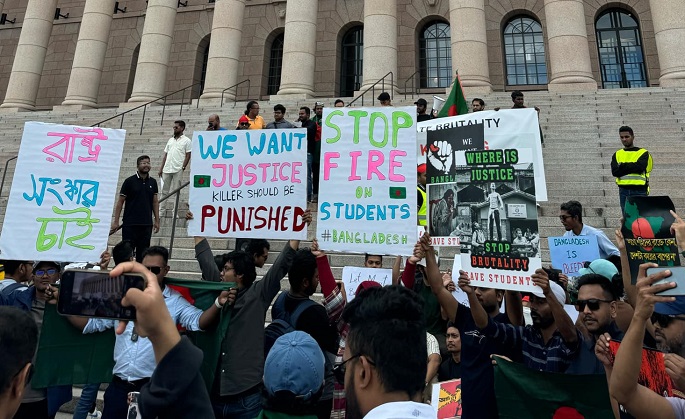Concern touches despite staying away
Bangladeshi Students Abroad Advocate for Quota Change
Published : 19 Jul 2024, 11:57
Updated : 19 Jul 2024, 15:55
Expatriate Bangladeshi students feel a strong sense of concern for their fellow Bangladeshi students back home, considering the recent protests regarding the quota system in government jobs. A court decision in June 2024 brought back the 30% quota for children and grandchildren of war veterans. This reversed the 2018 abolition of that specific quota.
This reinstatement sparked major protests by students who believe the quota system is unfair. They're demanding reforms or a complete shift to a merit-based system. The protests have turned violent, with a reported death toll of 25 so far!
The government, which ignored the students movement based on a valid ground at the initial stage, is now offering negotiation talks but the agitated students rejected it.
The government also appealed against the court order, and as of today, a status quo is in place, meaning the quota system isn't officially implemented but the court decision hasn't been overturned either.
The quota reform movement has gained significant support from expatriate Bangladeshi students, and has been a major issue of public interest and political discourse. Students abroad have organized processions and rallies to extend their support to the movement to drew international support and attention to the issue.
Expatriate students leverage social media platforms to disseminate information, share updates, and coordinate actions. They engage with international human rights organizations, foreign governments, and global media to gain support. Fundraising efforts by expatriate communities help sustain the movement financially, covering costs for protests, legal fees, and other organizational needs. These efforts aim to pressure the Bangladeshi government by raising the issue in the global arena.
The involvement of expatriate students has added a unique dimension to the movement, highlighting the solidarity and active engagement of the Bangladeshi diaspora on national issues. This global support network amplifies pressure on the government and underscores the widespread demand for reform beyond national borders.
The protest, which began as a peaceful demonstration, has now turned violent, with clashes between protesters and police together with ruling party supporters leading to deaths, injuries and destroying public properties. The question is, who is to blame for this terrible situation? The government has failed to tackle the crisis. Initially, they dismissed the student’s logical arguments. The government's delayed and inappropriate response and the suicidal move to engage ruling party leaders and activists exacerbated the situation, leading to the huge casualties.
The government also blames the opposition, claiming they have hijacked the movement. However, the real question is, who created the opportunity for the opposition to take the benefit of the students movement.? Once again, the answer would be the government. If the government had handled the crisis appropriately, no third party would have been able to get involved. Now, it is the government who will have to find the an amicable solution to the crisis.
Time is running out, and the government has missed the opportunity to act. The responsibility will go to the government in case of failure to resolve the crisis and restore congenial atmosphere in the country.
Background
In 1972, Bangladesh, newly independent country from Pakistan, introduced a quota system for government jobs. The primary goal was to acknowledge the sacrifices made by the "freedom fighters" and their families during the 1971 War of Independence. The quota system reserved 30% for freedom fighters' kin, 10% for war-affected women, 40% for regional (district quota) quotas, leaving 20% for merit-based recruitment.
The quota system has adjusted the allocation percentages throughout its history and by 2018, A whopping 56% of government job openings were reserved under various quotas. 30% for freedom fighter kin, 10% for women, 10% for regional quotas, and 5% for minorities and 1% for disabled.
In 2018, the government abolished quotas for certain government jobs following protests demanding reform. Large-scale student protests erupted due to concerns about limited opportunities for merit-based recruitment. Students felt the existing quota system, with over 50% of positions reserved, left them disadvantaged despite high qualifications.
In response to the protests, the government issued a circular in 2018 that abolished quotas for certain government job positions. This was a significant move aimed at appeasing the protesters and potentially creating a more meritocratic system. The abolition of quotas only applied to specific government jobs, not the entire system. This move wasn't universally popular. Some argued that quotas were necessary to ensure inclusivity for disadvantaged groups.


